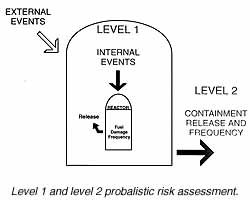![[Russia/America Flags]](inspmedia/cover.gif)
Enhancing Emergency Procedures and Operations
Plant Safety Evaluations Assess the Safety of Nuclear Power Plants
|
US Dept. of Energy Office of International Nuclear Safety and Cooperation 1000 Independence Ave S.W. Washington, DC 20585 (301) 903-0234 |
Plant safety evaluations are performed to establish safe operating limits, quantify safety margins, and rank the importance of various plant systems and operator actions in reducing overall risk of accidents at nuclear power facilities. The safety evaluations result in documented safety design bases and plant risk profiles, which can be applied to support safe plant operation and prioritize proposed safety upgrades. In addition, safety evaluations are the basis for regulatory decisions regarding continued plant operations.
Probabilistic and deterministic analytical methods are used in plant safety evaluations. Probabilistic risk assessment includes identifying system challenges (initiating events), modeling accident progression (event trees), and estimating system failure probabilities (fault trees). Level 1 probabilistic risk assessments evaluate the expected frequency of fuel damage from various hypothesized internal and external initiating events. Level 2 probabilistic risk assessments expand the Level 1 analysis to evaluate the frequencies and source terms associated with releases from containment. Level 3 analysis evaluates the dose consequences of the fission products released. A nuclear power plant's risk is defined by combining the expected frequency of the undesired events, defined in Level 1 and 2 analysis, with the dose consequence of fission product release, Level 3. Deterministic safety analyses are performed for accident scenarios to assess the safety level incorporated into a nuclear power plant design. Deterministic calculations identify the margins between limits imposed by design and regulatory requirements and the actual plant parameters that result from simulated accident scenarios. These calculations also provide necessary input for determining minimum system operational requirements to achieve a safe end state in an accident sequence. The calculations also may be used to evaluate changes in the plant technical specifications. The short-term goal of the U.S. Department of Energy's Soviet-Designed Reactor Safety Program is to help improve the overall safety at installations in host countries. A longer-term goal is to assist in establishing the infrastructure and technical expertise required to create a culture of safety in operations and maintenance. To achieve this goal, the U.S. DOE is transferring state-of-the- art technologies and providing training in the use of those technologies. Examples include:
|
